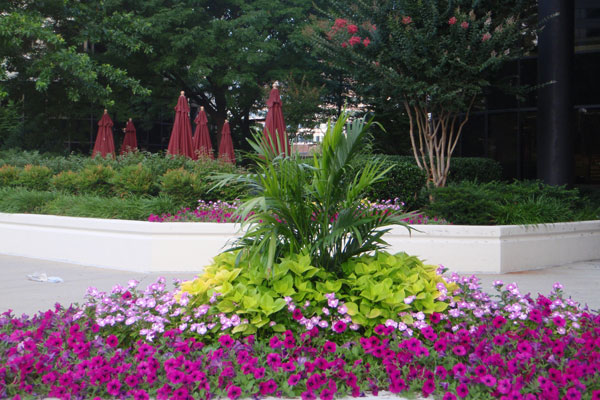The Impact of Landscaping on Tenant Well-being

Can beautiful landscaping make tenants happy?
IN ADDITION TO providing functional places for people to live and work, commercial property developers and managers have a unique opportunity to make a difference for tenants by paying close attention to the green spaces surrounding properties. According to the results of a recent study conducted by Stanford University researchers, “The Benefits of Nature Experience: Improved Affect and Cognition,” spending time in a natural setting has a positive effect on mood, cognitive function – including working memory – and anxiety. In other words, by offering attractive outdoor spaces where people can sit, visit and walk, beautifully landscaped buildings provide a better way for people to cope with the stresses inherent in modern-day living.
Landscaping for Well-being
Everyone feels better when they spend time in nature, but many people have lost touch with the natural environment. This is taking a toll on an alarmingly high number of people, as is indicated by a 2010 Harvard Health Letter, “A Prescription for Better Health: Go Alfresco.” By deploying a thoughtful commercial landscaping strategy, commercial property developers and managers can make a significant difference in three key areas:
1) Community. Natural settings encourage togetherness. Moving a conversation from the office to a patio, pausing to chat on a bench before heading from a car to a desk or enjoying a brown-bag lunch together in the shade of a maple tree all foster a sense of community among people who work side by side. Jerry Kilkenny, director of leasing, metro DC, at Brandywine Realty Trust, cites one instance where his team transformed the green space surrounding a suburban office building into attractive collaboration areas and was delighted to find the tenants using these gathering spots even more than expected.
2) Focus. According to the “Views to Nature: Effects on Attention,” an article in the March 1995 issue of the Journal of Environmental Psychology, people concentrate better when surrounded by a natural setting. The stillness of a tree outside the window, the peacefulness of fluttering butterflies or the quiet beauty of a flower garden have a clearing effect on cluttered minds.
3) Job Satisfaction. The results of a 2016 study, “Why We Need More Nature at Work: Effects of Natural Elements and Sunlight on Employee Mental Health and Work Attitudes,” showed a positive correlation between worker attitudes and exposure to natural elements. Direct sunlight, indoor plants and window views of natural scenes have a measurable impact on employees’ mental health and happiness at work.
Good for Business
Who wouldn’t want to lease space in a building that makes them feel better? Spencer R. Stouffer, vice chairman at Cushman & Wakefield, finds that “feeling better” can result in lower turnover rates and higher rents. In one example, Stouffer reports that the improved “outdoor space at Dulles Corner [an office complex in Herndon, Virginia] was instrumental in enabling us to improve occupancy from 76 to 94 percent and increase rents [significantly] in a 24-month period.”

Greg Ferrante, a senior vice president at JLL, agrees. “One of the easiest properties I have to lease is Clemson Corner in Frederick, Maryland, because of its attractiveness,” he says, “and this is largely due to the landscaping.” According to Ferrante, he was able to lease space at Clemson Corner for at least a 5 to 10 percent higher rent than comparable space nearby as a result of the property’s outdoor enhancements.
There’s no doubt that well-manicured outdoor spaces have the power to persuade. When prospective tenants feel that “mysterious something” at a site, the deal is more likely to be finalized. “I feel landscaping is critical to optimizing curb appeal for all commercial product types,” says Matt Pierce, president of Buchanan Partners.
“Landscaping is one of a property’s first visual impressions and needs to set the right tone for a prospective tenant’s property tour. It shows that ownership and property management care about the details.” Buchanan Partners and Elion Partners recently purchased a property in Chantilly, Virginia, with high vacancies and immediately invested capital dollars in improved landscaping. “The property still has a fair bit of vacancy,” he says. “But the improvements have already received very positive feedback from existing tenants and prospective touring tenants.”
By Fred Peratt, president, Environmental Enhancements, fredperatt@eelandscaping.com


